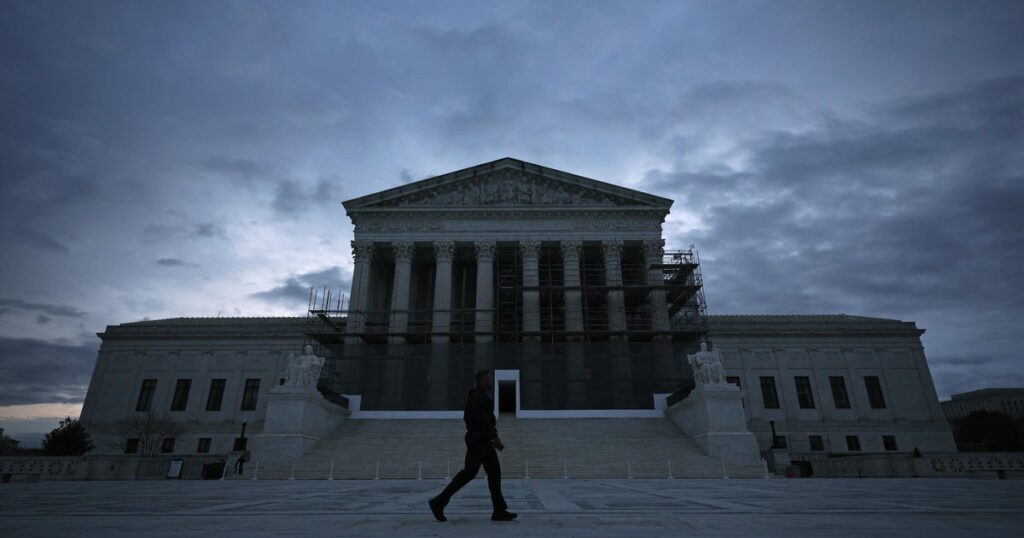Washington — The Supreme Court on Friday cleared the way for the Trump administration to withhold millions of dollars in federal education grants because it said they funded programs that involve diversity, equity and inclusion initiatives.
The high court split 5-4 in granting a request from the Justice Department to pause a federal district court order that required the Department of Education to reinstate the grants that had been awarded to universities and nonprofit organizations in eight states. The court said in an unsigned opinion that its stay will remain in place while legal proceedings move forward.
“Respondents have represented in this litigation that they have the financial wherewithal to keep their programs running. So, if respondents ultimately prevail, they can recover any wrongfully withheld funds through suit in an appropriate forum,” the court said. “And if respondents instead decline to keep the programs operating, then any ensuing irreparable harm would be of their own making.”
Chief Justice John Roberts joined with the three liberal justices in dissent.
The legal battle over the administration’s decision to cut off the grants is the latest challenging President Trump’s second-term policies to reach the Supreme Court, which has a 6-3 conservative majority. The Trump administration has sought to cut off federal assistance funding and foreign aid, but has so far been rebuffed by the courts.
There are three other requests for relief from the Justice Department that are still awaiting action from the Supreme Court, though more emergency appeals are expected to reach the justices as the president faces a slew of lawsuits targeting his second-term agenda.
At issue in this dispute over Education Department funds is up to $65 million in grants awarded through the Teacher Quality Partnership program and the Supporting Effective Educator Development program, which support teacher recruitment and training.
In early February, the acting secretary of education directed an internal review of the department’s grant awards to ensure they did not fund programs with DEI practices, which the Trump administration has claimed are discriminatory.
The Education Department ultimately decided 104 grants should be terminated because they did not align with its policy objectives, according to the Justice Department. Five grants were left in place, the department said.
Following the grant cancellations, a group of eight states sued the Trump administration and asked a federal district court to issue temporary relief while the case moved forward. The states — California, Massachusetts, New Jersey, Colorado, Illinois, Maryland, New York and Wisconsin — said organizations within their states received the grants and argued the terminations violated a federal law that governs the agency rulemaking process.
U.S. District Judge Myong Joun agreed to grant a temporary restraining order, in place until April 7, that required the government to reinstate the grants to recipients in the eight states. The court also temporarily blocked the government from reinstating the terminations, or cancelling any other awards for organizations in the states.
The Trump administration asked the U.S. Court of Appeals for the 1st Circuit to pause that order while proceedings continue, which it declined to do. The Justice Department then sought emergency relief from the Supreme Court.
In filings with the justices, acting Solicitor General Sarah Harris argued that the district court’s order is one of several that raise the question of whether a district court judge can force the government to pay out millions in taxpayer dollars.
“Unless and until this court addresses that question, federal district courts will continue exceeding their jurisdiction by ordering the executive branch to restore lawfully terminated grants across the government, keep paying for programs that the executive branch views as inconsistent with the interests of the United States, and send out the door taxpayer money that may never be clawed back,” she wrote.
Harris urged the Supreme Court to “put a swift end to federal district courts’ unconstitutional reign as self-appointed managers of executive branch funding and grant-disbursement decisions.”
In a separate case, the high court rejected an earlier bid from the Trump administration to pause an order that required it to pay out an estimated $2 billion in foreign-aid funding to groups that received money from the State Department and the U.S. Agency for International Development.
In a filing with the Supreme Court, lawyers for the states argued that the issue for the Justice Department is with other cases elsewhere, where courts are dealing with a slew of legal disputes arising out of Mr. Trump’s executive actions.
“Those concerns are properly litigated in the context of those other cases,” the states said in a filing. “They provide no basis for this court to grant emergency relief here, where the district court appropriately granted a narrow and time-limited restraining order to preserve the status quo while it adjudicates the preliminary-injunction motion that was argued earlier today.”
Lawyers for the states said that the grant recipients are providing a pipeline of qualified teachers for local schools within their states, and warned that if the awards could be cancelled, programs that they fund will have to be scaled back or shut down entirely.
“Any harm that defendants might face from the temporary restraining order in the few days remaining before that order expires is far outweighed by the immediate harm the states will suffer if the order were stayed or vacated,” they said.

